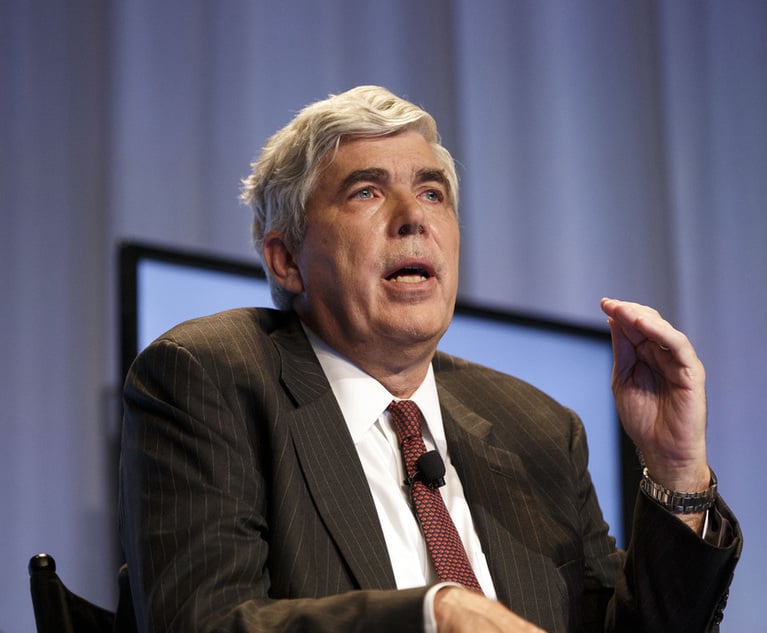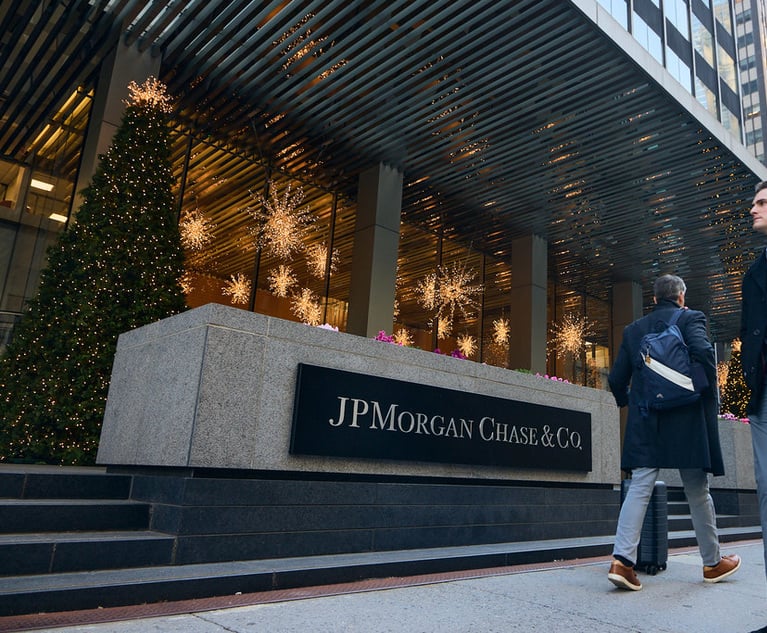CDS 'Net Short' Holder Market Developments
The market response to the perceived issues created by net-short holders continues to evolve.
September 20, 2019 at 02:20 PM
6 minute read
 Credit Default Swaps (CDS) are instruments that enable holders of bonds and loans to hedge their credit risk by purchasing protection against a default by the issuer/borrower on such instruments, and to enable investors that do not hold the underlying debt instruments to make bets on the likelihood of such defaults.
Credit Default Swaps (CDS) are instruments that enable holders of bonds and loans to hedge their credit risk by purchasing protection against a default by the issuer/borrower on such instruments, and to enable investors that do not hold the underlying debt instruments to make bets on the likelihood of such defaults.
The inherent conflict between sellers and buyers of CDS protection becomes more marked when a CDS protection buyer is either not exposed to the underlying debt, is "net-short" by virtue of holding a greater amount of CDS protection than its exposure to the underlying debt, or has acquired its position at a significant discount. In all of these instances, the CDS protection buyer stands to profit if a CDS credit event occurs.
There have been a number of recent situations where buyers of CDS protection have used their positions as holders of the issuer's debt to bring about CDS credit events.
In the Hovnanian situation, which played out in spring 2018, GSO Capital Partners had accumulated a $330 million position in CDS protection related to Hovnanian. GSO then offered Hovnanian refinancing at below market rates, but on condition that Hovnavian, through a subsidiary, acquire a small position in its own debt and then intentionally default on an interest payment on the debt held by that subsidiary, thereby triggering a credit event on the related CDS held by GSO.
During the 30-day grace period on the missed interest payment, Solus Asset Management, a holder of Hovnanian debt and seller of Hovnanian-related CDS protection, challenged the exchange transaction and the "manufactured" default in the Southern District of New York as a "fraudulent and manipulative scheme." Though Solus lost its request for a preliminary injunction, the matter was settled for undisclosed consideration which included GSO releasing Hovnanian from the covenant requiring it to miss the interest payment and Hovnanian curing the resulting event of default before the grace period expired and before a CDS credit event could occur.
In the Windstream situation, Aurelius Capital Management had accumulated $300 million of Windstream notes and reportedly ten times that amount in Windstream-related CDS. Aurelius then asserted that a purported sale-leaseback transaction two years prior created a default under its notes, which would have the effect of triggering its CDS protection. Windstream challenged the default notice in court. The court upheld Aurelius' position and Windstream consequently filed for bankruptcy. CDS protection sellers later sought to block Aurelius from tendering its notes at the Windstream CDS auction on the basis that pending equitable subordination claims against Aurelius should disqualify it from participation; ISDA rejected the challenge and instructed the auction to proceed.
These situations, albeit very different in their details, have brought to the forefront concerns about the conflicted motivations of holders of debt that are also buyers of CDS protection, particularly where such holders are "net-short", i.e., holding CDS protection with greater notional amounts than their underlying exposure to the debt. In the wake of these events, PE sponsors/borrowers and the loan and bond markets have responded to the "net-short" problem with a host of new provisions intended to address the issue. These provisions have different iterations and nuances and continue to evolve.
In the loan market, the initial response to the net-short issues has been to seek to disenfranchise net-short holders. Certain credit agreements now say that lenders which, as a result of such lenders or their affiliates holding interests in CDS and similar instruments, have a net-short position with respect to the loans, have no right to vote for or against any amendment or waiver relating to the loans, nor can they direct the Administrative Agent or any lender to take any action under the loan documents. The newest "net-short" innovation which has been proposed in certain credit agreements is to count net-short lenders as disqualified lenders, such that the borrower can force a net-short lender to sell its loans at par or, more drastically, at the lesser of par and the amount it paid to purchase the loans.
The bond markets have included some of these elements as well as additional ones. Select recent bond indentures (i.e., Sirius) require directing bondholders to represent that they are not net-short holders, and also include the ability to "yank" net-short bondholders at the lesser of par and the most recent quoted price for the debt.
Additionally, certain recent indentures have included a contractually shortened statute of limitations pursuant to which notices of default have to have been submitted to the Trustee—typically within two years of the event that caused the alleged default provided the event was reported publicly or directly to bondholders. Those same indentures (i.e., Allied Universal, Axus, Nexstar, Grubhub) also provide that cure periods may be extended or stayed by the issuer if the issuer demonstrates that the notice of default was submitted by a net-short holder, or by a judge if the cause of the default is the subject of litigation.
In addition to these contractual provisions, issuers are beginning to include risk factors in offering documents which are clearly directed at net-short holders, warning potential investors that other investors may seek to financially benefit by triggering defaults under the indentures. Other risk factors point out possible decreases in liquidity due to the new net-short holder provisions and the theoretically reduced investor pool that could result.
The cumulative goals of these new provisions are to take influence away from net-short holders, on the theory that investors which stand to gain more from a default than from the loans or bonds being in good standing should not be able to impact the outcome of amendment or restructuring process, to provide mechanisms by which net-short investors can be removed from the investor pool without unduly profiting from their actions, and to provide mechanisms to make it more difficult for issuers/borrowers to be brought down by long stale defaults.
The market response to the perceived issues created by net-short holders continues to evolve. Provisions addressing these issues are far from uniform, are by no means widely accepted and are a work in process. But issuers are clearly taking these issues seriously and many are seeking to address it in their documents when they have the leverage to do so. As such, it seems likely that there will be long standing changes in loan and bond documentation as a result of these issues, though the exact form that such changes will take remains to be seen.
Matthew Roose and Alyson Gal are partners, Jill Kalish Levy is a counsel and Andrew Glantz is an associate at Ropes & Gray.
This content has been archived. It is available through our partners, LexisNexis® and Bloomberg Law.
To view this content, please continue to their sites.
Not a Lexis Subscriber?
Subscribe Now
Not a Bloomberg Law Subscriber?
Subscribe Now
NOT FOR REPRINT
© 2024 ALM Global, LLC, All Rights Reserved. Request academic re-use from www.copyright.com. All other uses, submit a request to [email protected]. For more information visit Asset & Logo Licensing.
You Might Like
View All
Trump Mulls Big Changes to Banking Regulation, Unsettling the Industry


Trump's SEC Overhaul: What It Means for Big Law Capital Markets, Crypto Work
Trending Stories
- 1Call for Nominations: Elite Trial Lawyers 2025
- 2Senate Judiciary Dems Release Report on Supreme Court Ethics
- 3Senate Confirms Last 2 of Biden's California Judicial Nominees
- 4Morrison & Foerster Doles Out Year-End and Special Bonuses, Raises Base Compensation for Associates
- 5Tom Girardi to Surrender to Federal Authorities on Jan. 7
Who Got The Work
Michael G. Bongiorno, Andrew Scott Dulberg and Elizabeth E. Driscoll from Wilmer Cutler Pickering Hale and Dorr have stepped in to represent Symbotic Inc., an A.I.-enabled technology platform that focuses on increasing supply chain efficiency, and other defendants in a pending shareholder derivative lawsuit. The case, filed Oct. 2 in Massachusetts District Court by the Brown Law Firm on behalf of Stephen Austen, accuses certain officers and directors of misleading investors in regard to Symbotic's potential for margin growth by failing to disclose that the company was not equipped to timely deploy its systems or manage expenses through project delays. The case, assigned to U.S. District Judge Nathaniel M. Gorton, is 1:24-cv-12522, Austen v. Cohen et al.
Who Got The Work
Edmund Polubinski and Marie Killmond of Davis Polk & Wardwell have entered appearances for data platform software development company MongoDB and other defendants in a pending shareholder derivative lawsuit. The action, filed Oct. 7 in New York Southern District Court by the Brown Law Firm, accuses the company's directors and/or officers of falsely expressing confidence in the company’s restructuring of its sales incentive plan and downplaying the severity of decreases in its upfront commitments. The case is 1:24-cv-07594, Roy v. Ittycheria et al.
Who Got The Work
Amy O. Bruchs and Kurt F. Ellison of Michael Best & Friedrich have entered appearances for Epic Systems Corp. in a pending employment discrimination lawsuit. The suit was filed Sept. 7 in Wisconsin Western District Court by Levine Eisberner LLC and Siri & Glimstad on behalf of a project manager who claims that he was wrongfully terminated after applying for a religious exemption to the defendant's COVID-19 vaccine mandate. The case, assigned to U.S. Magistrate Judge Anita Marie Boor, is 3:24-cv-00630, Secker, Nathan v. Epic Systems Corporation.
Who Got The Work
David X. Sullivan, Thomas J. Finn and Gregory A. Hall from McCarter & English have entered appearances for Sunrun Installation Services in a pending civil rights lawsuit. The complaint was filed Sept. 4 in Connecticut District Court by attorney Robert M. Berke on behalf of former employee George Edward Steins, who was arrested and charged with employing an unregistered home improvement salesperson. The complaint alleges that had Sunrun informed the Connecticut Department of Consumer Protection that the plaintiff's employment had ended in 2017 and that he no longer held Sunrun's home improvement contractor license, he would not have been hit with charges, which were dismissed in May 2024. The case, assigned to U.S. District Judge Jeffrey A. Meyer, is 3:24-cv-01423, Steins v. Sunrun, Inc. et al.
Who Got The Work
Greenberg Traurig shareholder Joshua L. Raskin has entered an appearance for boohoo.com UK Ltd. in a pending patent infringement lawsuit. The suit, filed Sept. 3 in Texas Eastern District Court by Rozier Hardt McDonough on behalf of Alto Dynamics, asserts five patents related to an online shopping platform. The case, assigned to U.S. District Judge Rodney Gilstrap, is 2:24-cv-00719, Alto Dynamics, LLC v. boohoo.com UK Limited.
Featured Firms
Law Offices of Gary Martin Hays & Associates, P.C.
(470) 294-1674
Law Offices of Mark E. Salomone
(857) 444-6468
Smith & Hassler
(713) 739-1250







